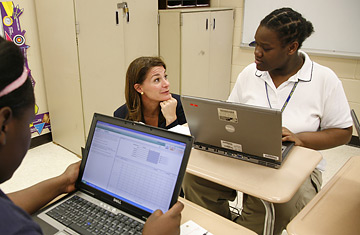
Melinda Gates talks to students in a math class at John Hope College Prep High School, Chicago, Illinois, April 24, 2007
The "Ed in '08" campaign, announced Wednesday afternoon in Columbia, S.C., on the eve of the first debate among Democratic Presidential candidates, is the joint project of two of the biggest education philanthropies in the nation: the Bill and Melinda Gates Foundation and the Eli and Edythe Broad Foundation. Each is putting up $30 million to promote a grassroots, multimedia campaign — creating probably the biggest single-issue war chest in American campaign history. Once the world leader in high school graduation rates, the U.S. now ranks 19th, according to one study. "The future of this country is dependent on kids getting a great education, and not just kids in a certain social class but every kid," said Melinda Gates, in an interview with TIME. "Getting it on the Presidential agenda is critical. Both Bill and I will speak out on this."
But getting the Presidential candidates to engage in more than platitudes about education and photo ops with school kids will be a challenge. Through a new organization called Strong American Schools and chaired by former Colorado Governor Roy Romer, the Gates and Broad foundations will press each candidate to specifically address three key issues:
—How to get all 50 states to agree to a demanding set of standards for K-12 education. Right now, according to an analysis by the Thomas B. Fordham Foundation, only nine states earn a B-minus or above for what they teach.
—How the nation's schools can attract and train more effective teachers.
—How to go about lengthening the school day and/or school year, so that kids who are behind can get more attention and so that all U.S. students get at least as much instructional time as do kids in competing nations. None of this will be easy. With their long history of support from teachers' unions, Democrats have been reluctant to criticize or demand more from the profession. Republicans, meanwhile, tend to oppose any movement toward national standards.
The non-partisan campaign will focus its efforts in early-primary and battleground states with TV, radio and print ads, a website and on-the-ground volunteers. It's counting on parents, who are increasingly anxious about whether their kids can compete with the studious youth of India and China, to press reluctant candidates for concrete plans. The fate of other top domestic issues, observes philanthropist Eli Broad, ultimately depends on educating the next generation. "If we want to maintain our standard of living, pay for health care, protect the environment and have the resources to take care of the elderly, we will need a far better educated workforce," Broad told TIME. "We need to get the public engaged, so that those who want to maintain the status quo aren't the only ones speaking."
